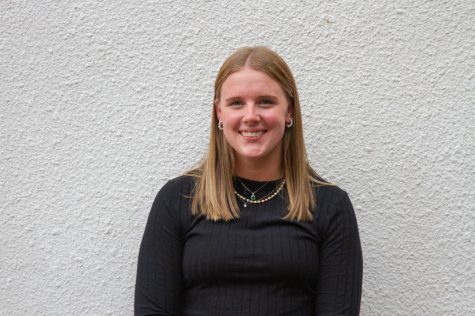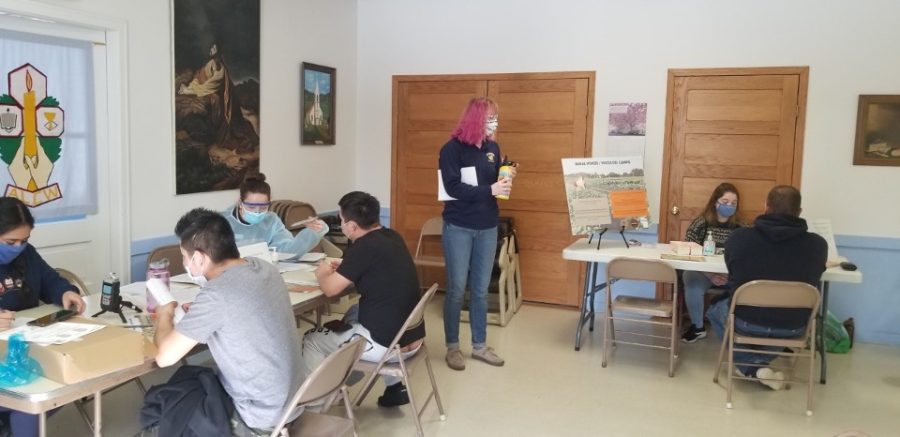UW-Eau Claire programs recognized for archive of pandemic
UW-Eau Claire earns award from Wisconsin Historical Society for archiving pandemic
UW-Eau Claire’s public history program, the McIntyre Library and the Chippewa Valley Museum have come together to create a digital archive of the COVID-19 pandemic.
This project has been honored for its innovation by the Wisconsin Historical Society.
The archive was created by Cheryl Jimenez-Frei, assistant professor of history, and Gregory
Kocken, head of Special Collections and Archives at UW-Eau Claire, as well as an associate professor for the history department.
In the spring of 2020, Jimenez-Frei’s public history courses were tasked with creating a physical exhibit for their field work. With the unexpected transition to online classes, a physical exhibit was no longer an option for her students.
After deciding a digital exhibit would not be feasible for the project or the students involved, Jimenez-Frei had the idea to document the experiences of the pandemic.
“I just thought, ‘well, we are living in a historic moment right now. Why don’t we document that,’” Jimenez-Frei said.
She decided to create a “rapid response collection,” meaning collecting history as it’s happening.
“Instead of waiting decades and looking back and putting back the pieces of what that was,” Jimenez-Frei said. “Let’s understand and recognize that we are in a historic moment that people are going to want to study and understand.”
She approached her students and fellow associate professor of public history, Greg Kocken, about creating the project.
“One of my motivations for starting this project was an opportunity to understand not just how the pandemic impacted our communities but how it impacted individuals within a community,” Kocken said.
Together, they created a digital archive through a portal that people could access and engage with.
Kocken said they knew there would be additional interest in archiving the pandemic, so he reached out to Jodi Kiffmeyer, the archivist at the Chippewa Valley Museum. This created the partnership between the university and the museum.
Both Jimenez-Frei and Kocken emphasized the importance of hearing the stories of marginalized identities that are often underrepresented in historical events.
“There’s a lot that this project will be able to show us. In terms of the effects of the pandemic, we do know that it has already hit Latinx, indigenous, and black communities harder than it has anyone else,” Jimenez-Frei said.
In order to get these perspectives, public history students were tasked with recording oral histories of individuals in the community.
Alexis Polencheck, a fourth-year history student, was one of the students involved with recording some of the oral histories.
Polencheck was a part of the “Rural Voices/Voces del Campo” project. This project was created to record the unique experiences of immigrant or undocumented farm workers in Wisconsin.
Jimenez-Frei says the reliance on Latinx immigrant workers in agriculture in Wisconsin came from a lack of workers due to World War II and continues to depend on immigrants and undocumented workers to this day.
Because of this, Jimenez-Frei determined it was vital to include their unique experiences in the archive.
Through the Rural Voices/Voces del Campo project, public history, Spanish and nursing students collaborated to travel to farms and create vaccine clinics for these farmers and document their experiences.
Polencheck said that working on the project and archiving these stories was one of the most impactful aspects of this project.
“Undocumented immigrants have a totally different experience than we do, I really appreciate the work that they did,” Polencheck said.
Jimenez-Frei, Kocken and Polencheck said they are all very excited and honored to receive the award from the Wisconsin Historical Society.
“I am incredibly grateful for the project partners that have allowed our project to be recognized as such an innovative archival practice,” Kocken said.
Both Jimenez-Frei and Kocken said there is more data to be collected and that the archive project will continue for the duration of the pandemic.
The collection website contains oral histories of individuals and their experiences of the pandemic as well as uploads of artifacts relevant to the time and circumstances of the pandemic.
Jimenez-Frei said she encourages everyone to share their stories and artifacts and emphasizes that everyone’s stories are relevant and important.
Those interested in uploading material relevant to COVID-19 can submit their story or artifact to this web page.
Shanahan can be reached at [email protected].

Avery Shanahan is a fourth-year communications and sociology student. This is her second semester on The Spectator and her first semester as news editor! In her free time Avery loves to read, run and thrift shop!











